

In this fun future continuous speaking activity, students ask and answer questions about a planned day trip. First, students look at your planned timetable for a day trip next Saturday. Students then test your memory of the timetable by asking you questions using the future continuous, e.g. 'What will you be doing at half past one on Saturday?' Afterwards, each student prepares their own timetable for a day trip. In pairs, students then swap timetables and ask questions to test each other’s memory using the future continuous. The winners are the students who answer all the questions correctly.
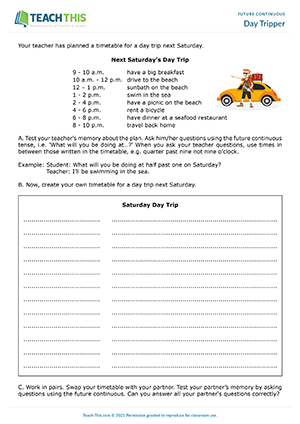


In this future continuous true or false board game, students practice future continuous questions, statements and time expressions. Students take turns rolling the dice and moving their counter along the board. When a student lands on a square, they pick up a true or false card from the pile and look at it. The student then makes a future continuous sentence using the prompt and time expression on the square, giving either true or false information as indicated on the card, e.g. 'At 7 p.m. today, I'll be doing my homework.' The other students then ask future continuous questions to determine if the student is lying or telling the truth, e.g. 'What homework will you be doing?' After a few questions have been answered, the group members guess whether the student's answer is true or false. The student then reveals the answer. The group members who guessed correctly each score one point. The next student then rolls the dice, and so on. When a student reaches the finish, the game ends and the points are added up. The student with the most points wins the game.
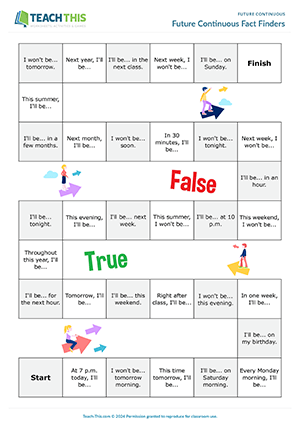


This free future continuous worksheet helps students learn and practice how to form and use the future continuous tense. To begin, students read two future continuous sentences and answer questions about their grammar. Students then complete a text with words that make up the future continuous structure. Next, students complete each sentence with the verb in brackets in the future continuous tense using the positive or negative form as appropriate. After that, students complete sentences with verbs from a box in the future continuous. Next, students use the future continuous to complete sentences with true information about what they will be doing at the times shown. In pairs, students then write sentences, guessing what they think their partner will be doing at the same times. Finally, students ask their partner what they will be doing at those times. For each correct guess, students score a point. The student with the most points wins.
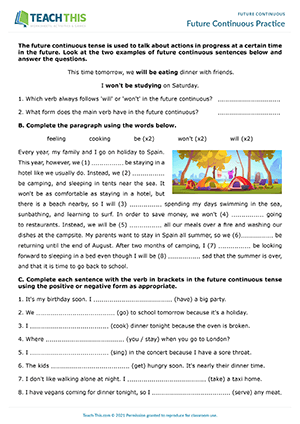


In this useful future continuous information gap activity, students use the future continuous to write clues about what Paolo will be doing at certain times during the day and guess where he will be from the clues. In two groups, students write clues in the future continuous about what Paolo will be doing at certain times. When the students have finished, they pair up with someone from the other group. Next, students take turns asking their partner what Paolo will be doing at the times shown at the bottom of their worksheet, e.g. 'What will Paolo be doing at 6 a.m.?' Their partner then reads out their future continuous clues, and the student tries to guess where he will be at that time, according to what he will be doing. Once a student has guessed the place, they write it down under the time. The activity continues until all the places have been guessed.
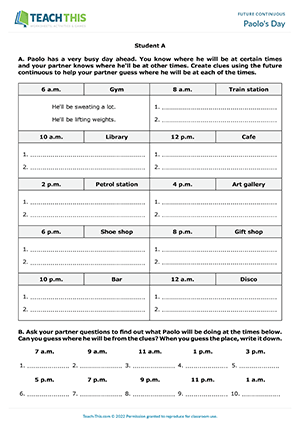


In this engaging future continuous game, students listen to clues and guess what a partner will be doing at various times using the future continuous tense. In teams of two, students take turns picking up a card and reading the two clues written on the card to their partner using the future continuous. The two clues explain what the student will be doing at a certain time, e.g. 'At 6:00, I will be hitting a ball with a club. I will be walking around a course.' Their partner then has 30 seconds to guess what they will be doing at that time, whilst the other team times them. If the student manages to guess correctly and say the sentence written at the bottom of the card, the team wins and keeps the card, e.g. 'At 6:00, you'll be playing golf.' If not, the other team can guess and keep the card if they are successful. The team with the most cards at the end of the game is the winner.
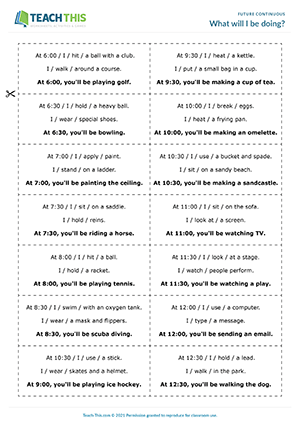


In this imaginative future continuous game, students mime and guess plans in an itinerary for a weekend overseas trip. In two groups, students begin by completing sentences about an itinerary for a weekend trip with verbs in their future continuous form. Next, students pair up with someone from the other group and take turns asking their partner what they will be doing at the times missing from their table, e.g. 'What will we be doing at 2:00 p.m. on Friday?' Their partner then mimes the plan, and the other student tries to guess what it is by saying a sentence in the future continuous, e.g. 'At 2:00 p.m. on Friday, we will be skiing down a mountain.' When the mime has been correctly guessed, the student writes the plan in their table. The pairs then swap roles, and it is the other student's turn to ask a question. The first pair to correctly complete the itinerary wins.
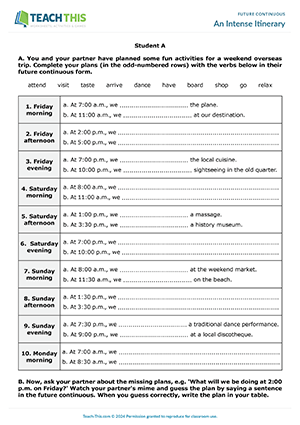


Here is a work-themed future continuous worksheet for upper-intermediate students. First, students complete sentences about the shifts of four workers using verbs from a box in their future continuous form and then match the sentences to jobs. Next, students match sentence halves to form sentences about a day in the life of a teacher and then complete them with verbs in the future continuous form. After that, students complete future continuous questions about a business trip with verbs in their correct form. Lastly, students think of a job and imagine that they are a person who does that job. Students then write future continuous sentences describing their work day and read them to a partner, who tries to guess their job.
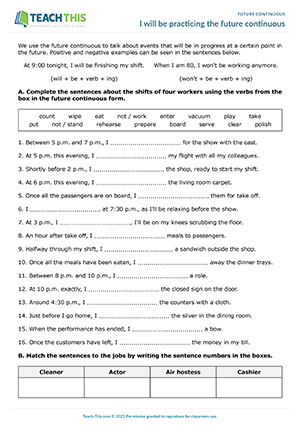


In this entertaining future continuous speaking activity, students try to guess what activities their partner has planned for them for next week by asking future continuous questions. In pairs, one student starts by asking future continuous yes/no questions about the activity planned for them for Monday, e.g. 'Will I be needing money?' Their partner answers yes or no accordingly. After a few questions have been asked, the student guesses the activity. If the student is having trouble guessing, their partner can provide clues using the future continuous, e.g., 'You will be watching a performance.' When the student has guessed the activity, they write it down under the corresponding day and continue on to the next day. When a student has guessed all the activities, the two students swap roles and repeat the process.